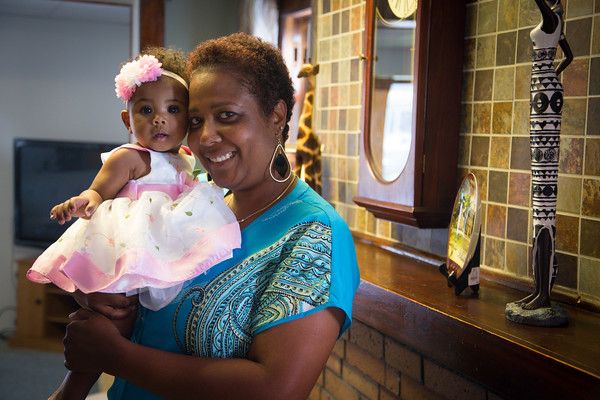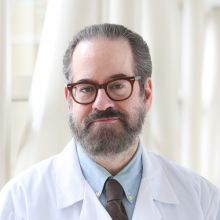Annette Hill got wonderful news in early May of 2014 when she learned she was pregnant. But toward the end of the month, after discovering a lump in her breast and pointing it out to her doctor, she got hit with a very different kind of news: she also had stage III breast cancer.
“My heart stopped. I lost my breath. I didn’t know what to do,” says Ms. Hill, who is a clinical laboratory technologist in Roswell Park’s Pathology Department. “I thought, I don’t want to die. My thoughts immediately went to my two other children, who at the time were five and three.”
Cancer treatment when the patient is pregnant
Shicha Kumar, MD, FACS, formerly of Roswell Park, and Ellis Levine, MD, Department of Medicine, helped relieve Ms. Hill’s anxiety and worked with her to develop a plan aimed at treating the cancer successfully while protecting the unborn baby.
In patients who are not pregnant, breast cancer is typically treated with surgery, radiation and chemotherapy. But because radiation could harm Ms. Hill’s baby, that part would have to wait until after the delivery. In the meantime, Dr. Kumar performed the surgery to remove the tumor.
Then came 16 weeks of chemotherapy. For this part of the treatment plan, timing was critical. “You cannot treat a woman safely with chemotherapy during the first three months of pregnancy, when a lot of the baby’s organs are developing,” explains Dr. Levine. “But once most of the development has occurred and the baby is just in a growth phase, you can give chemotherapy — with certain drugs — during the last six months.”
The three drugs Ms. Hill received — Adriamycin, Cytoxan, and Taxol — “have been around for many years,” he adds. Babies whose mothers receive those drugs while pregnant “usually do well, and the rates of birth defects are no greater than they are for other babies. Fortunately, they are also the three most active drugs in breast cancer.”
Dr. Levine says Roswell Park treats between two and four pregnant cancer patients every year, and in every case the team works closely with an obstetrician who handles high-risk pregnancies. “Usually the woman is seeing not only us but her obstetrician at the same time, and we’re coordinating her care.”
A powerful dose of love and support
Looking back, Ms. Hill doesn’t pull any punches. Chemotherapy “was rough,” she says. Between the side effects and morning sickness, “I couldn’t keep anything down, and I lost 30 pounds.” But she was able to tolerate vegetables with hummus, and her mother was there “to make sure I had something in front of me.
“I am so lucky. Even now, the support I had from my family makes me want to cry, because if I didn’t have them, I don’t know what I would have done.” Her sister even moved back to Buffalo from North Carolina to be near her and help her get through the ordeal.
“You think about your baby every single moment — every single moment,” says Ms. Hill. “The whole time I was going through the pregnancy, I was thinking, Lord, please let everything be OK.”
She completed her chemotherapy treatments on schedule. Just one week later, on Nov. 12, 2014, Kara Michelle was born, weighing in at a respectable four pounds, eight ounces. “She’s absolutely fine,” says her proud mom. “She has no health issues.”
Ms. Hill laughs when she remembers seeing her baby for the first time. “I was bald, but she had all this hair.”

